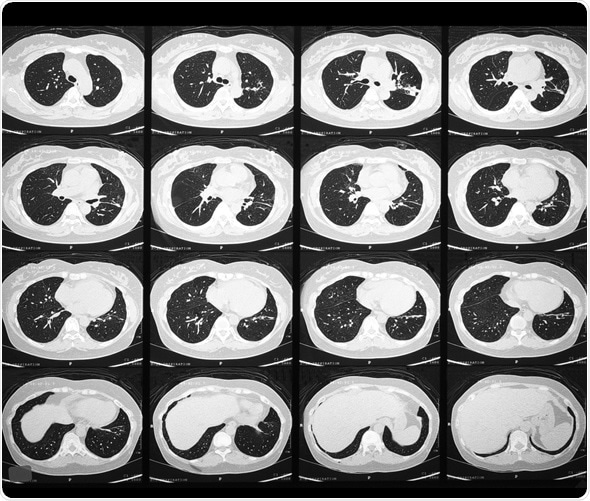Nephrotic syndrome is characterized by a set of signs and symptoms including proteinuria, low protein levels in the blood, hypercholesterolemia, hypertriglyceridemia, and edema. It may be caused by various disorders of the kidney, and the management of the condition varies according to the specific case and the cause of the symptoms.

HRCT Scan of Chest in a 42 years old woman with Nephrotic syndrome - Image Copyright: Santibhavank P / Shutterstock
Symptoms
The signs and symptoms of nephrotic syndrome are caused by changes in the levels of protein in the urine and blood, which also affect the levels of cholesterol and triglycerides. The symptoms may include:
- Edema
- Skin rash
- Foamy urine
- Reduced appetite
- Unintentional weight gain
The most obvious and commonly reported symptom of nephrotic syndrome is edema. The build up of fluid and swelling may occur in various parts of the body, such as the face, arms, legs, feet or abdomen.
In severe cases, patients may experience seizures as a result of nephrotic syndrome.
Causes
There are many possible causes of nephrotic syndrome, usually a disorder that affects the function of the kidneys.
Under normal circumstances, no protein is excreted via the urine – in fact, protein cannot pass through the glomerular filter to enter the kidneys. The disorders that lead to nephrotic syndrome affect this process and allow protein to enter the kidneys and be excreted via the urine, thereby reducing the protein levels in the blood.
Possible causes may include:
- Minimal change disease (most common cause for children)
- Membranous glomerulonephritis (most common cause for adults)
- Diabetes
- Systemic lupus erythematosus
- Multiple myeloma
- Amyloidosis
- Genetic disorders
- Immune disorders
- Infections (e.g. hepatitis or mononucleosis)
- Medication combinations
- Cancer
Diagnosis
As nephrotic syndrome is defined by a set of symptoms, tests are needed to determine the cause of theseand make an accurate diagnosis. These tests include analysis of blood and urine samples in a laboratory to assess the function of the kidneys.
Diagnostic tests that may be used for patients with nephrotic syndrome include:
- Blood tests: albumin, metabolic panels, blood urea nitrogen (BUN), creatinine, cholesterol, triglycerides
- Urine tests: creatinine clearance, proteinuria
- Urinanalysis
In some cases, a kidney biopsy may be required to determine the cause of nephrotic syndrome.
Management
The treatment of nephrotic syndrome will depend on the cause but the general aim of treatment is to relieve symptoms, prevent complications and reduce any damage to the kidneys.
Reducing the blood pressure to less than 130/80 is often indicated, as this helps to delay any damage to the kidneys. Commonly used antihypertensive medications for this purpose are angiotensin-converting enzyme (ACE) inhibitors and angiotensin receptor blockers (ARBs), as these classes of drugs can also help to reduce the excretion of protein in the urine.
Other treatments that may be used include:
- Corticosteroids to suppress the immune system
- Statins to reduce cholesterol and reduce risk of cardiovascular disease
- Diuretics to reduce edema
- Vitamin D supplements for unresponsive cases
- Blood thinner medications to prevent the formation of blood clots
Nutrition and lifestyle advice is also important for people with nephrotic syndrome. A low-sodium diet is often helpful to reduce edema in the arms and legs, and a diet with reduced protein can also be beneficial.
References
Further Reading
Last Updated: Feb 27, 2019